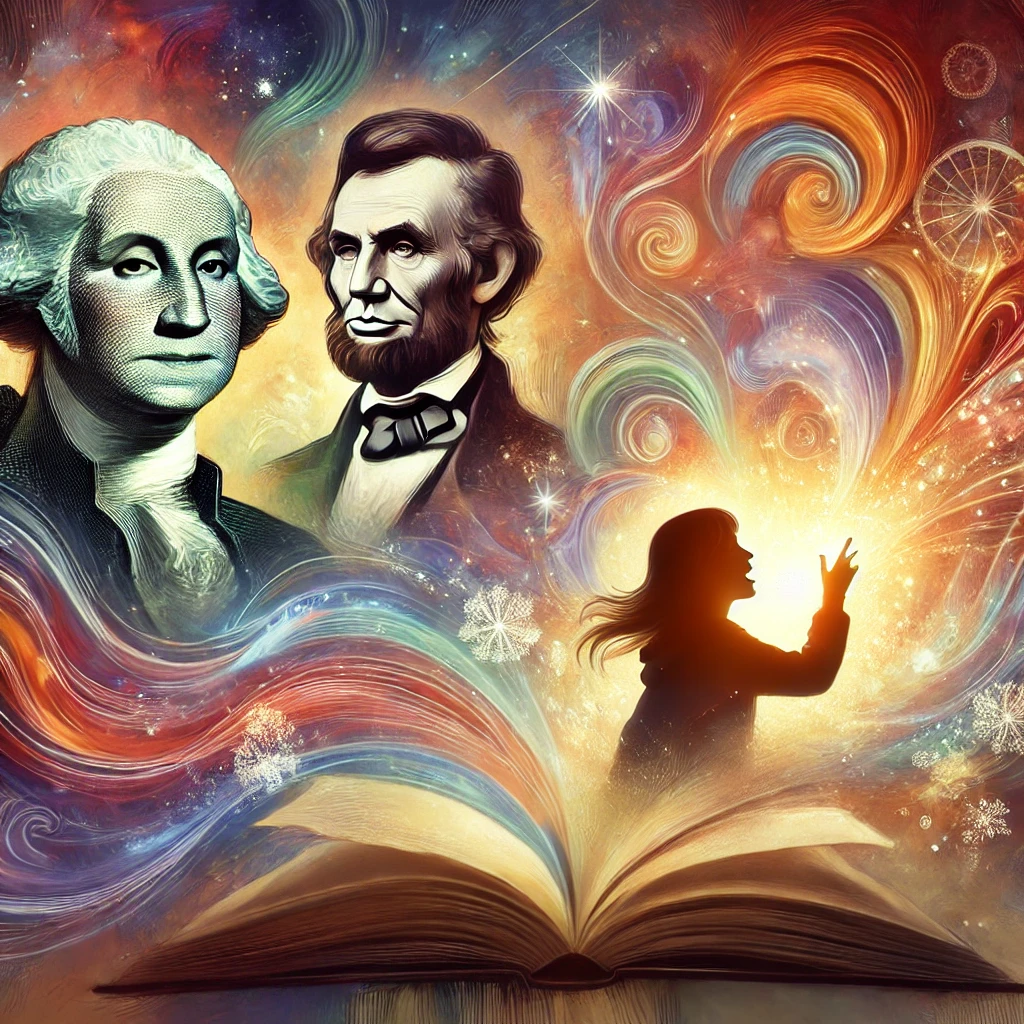There’s something special about the way a story unfolds—the way it brings history to life, connects people across cultures, and empowers individuals to share their own experiences. This is exactly what happened in our latest Be the Voice of Girls virtual session, where broadcaster and storyteller Andrew McCrea took us on a journey through American history and the power of storytelling.
As the session began, there was a familiar buzz of excitement. The girls greeted one another, sharing bits about their week. Some had just taken an unexpected English exam for a student exchange program, and the challenge of it lingered in their conversations. But soon, they turned their focus to the session ahead, knowing that Andrew would once again open their minds to new ideas, fresh perspectives, and, of course, stories.
A Lesson in Leadership: Presidents’ Day and the Leaders Who Shaped a Nation
Andrew started with a question: “What do you know about Presidents’ Day?” A few voices chimed in, hesitant at first, then growing more confident. Some had heard of it, but few knew why it was celebrated.
“Presidents’ Day,” Andrew explained, “honors all U.S. presidents, but especially George Washington and Abraham Lincoln, who were both born in February.” He painted a vivid picture of Washington’s leadership, how he led the United States through its early years and made a defining decision—to step away from power rather than become a king.
The conversation soon shifted to Lincoln, a president whose story resonates across the world. The girls listened intently as Andrew described Lincoln’s humble beginnings, the way he taught himself to read, and how he ultimately led the country through one of its darkest times—the Civil War. They learned that Lincoln’s legacy wasn’t just about politics; it was about breaking barriers and changing the course of history.
As the discussion deepened, an important topic emerged—women in leadership. One of the girls voiced a thought many had been pondering: “Why has the United States never had a woman as president?” The question lingered for a moment before Andrew responded.
“We’ve come close,” he said, mentioning past female candidates who had won millions of votes. “And I believe it’s only a matter of time.”
The conversation quickly became more personal. The girls reflected on the challenges women face in leadership—not just in the U.S., but in their own communities. There was a shared sense of determination in their voices, a quiet but powerful acknowledgment that they, too, could be part of the change.
The Stories We Tell: Understanding the Art of Storytelling
With history fresh in their minds, Andrew guided the discussion toward another form of leadership—one that doesn’t require an election or a title: The ability to tell a story.
“Stories shape the way we see the world,” he said, leaning into his own experience as the host of American Countryside, a radio program that shares stories of everyday people with extraordinary experiences. He encouraged the girls to think about the stories in their own lives.
“What makes a good story?” he asked. “It’s not always about being famous or having done something big. Sometimes, it’s about capturing a moment, a feeling, or a lesson that others can connect with.”
The girls were captivated as Andrew shared examples—stories of unsung heroes, small towns with remarkable histories, and personal experiences that held deep meaning.
Then came the challenge: Find a story worth telling.
Andrew asked them to think about people in their own lives—family members, teachers, neighbors—who might have a story waiting to be told. What makes them special? How have they shaped their communities? The girls would soon be conducting their own interviews, stepping into the role of storytellers themselves.
A Space for Reflection and Growth
As the session neared its end, the discussion circled back to an idea that had been woven throughout the conversation—the importance of using one’s voice. Whether through history, leadership, or storytelling, the ability to express thoughts, share experiences, and ask meaningful questions is one of the most powerful tools anyone can have.
Andrew left them with one final thought: “The more you share your voice, the more the world will listen.”
And with that, the girls left the session not just with new knowledge about Presidents’ Day or the structure of American democracy, but with something far greater. They left with a renewed sense of purpose—a belief that their voices, their stories, and their perspectives matter.
As they began to brainstorm the stories they would tell, one thing was certain: the voices of these young women would not go unheard.


